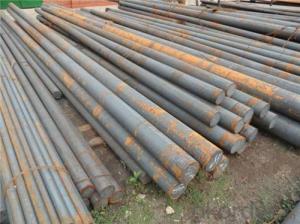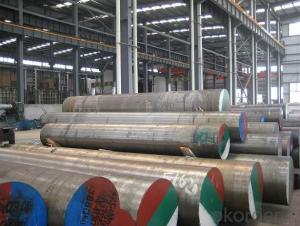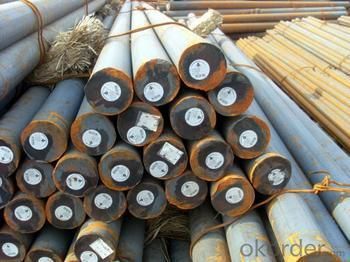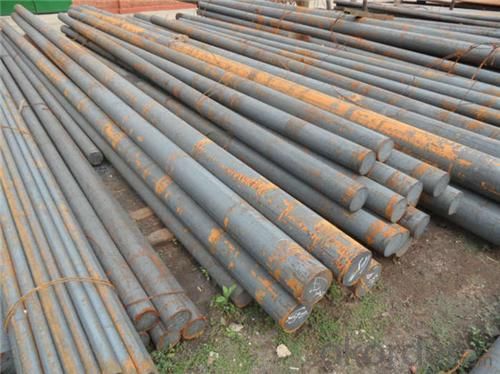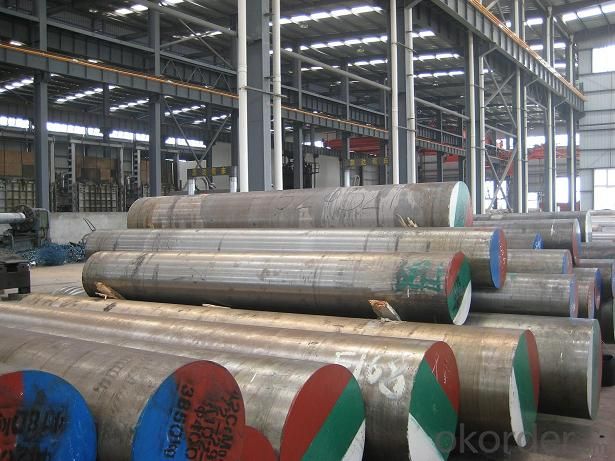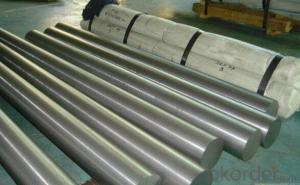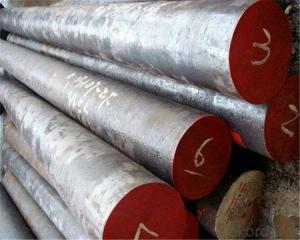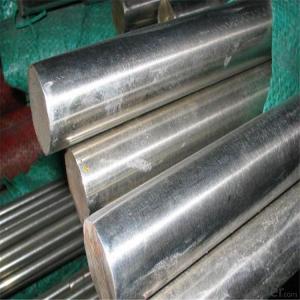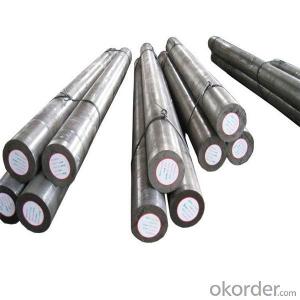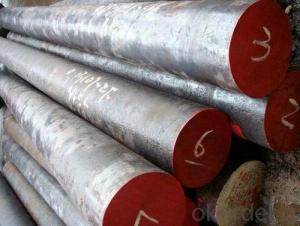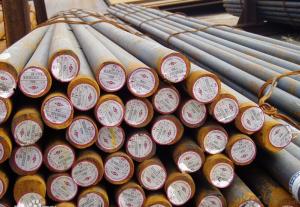JIS Scr420,DIN 20Cr4,SAE 5120, Alloy Steel Bar
- Loading Port:
- China main port
- Payment Terms:
- TT or LC
- Min Order Qty:
- 25 m.t.
- Supply Capability:
- 10000 m.t./month
OKorder Service Pledge
OKorder Financial Service
You Might Also Like
Specification
JIS Scr420,DIN 20Cr4,SAE 5120, Alloy Steel Bar
Product information:
Hot rolling craftwork and fine mechanical performance
Chemical components meet standards, delivery in black skin
Standards: a) JIS Scr420 b) Din 20Cr4 c) ASTM 5120 d)GB/T3077 20Cr
Size: dia 16-200mm
Length:6M above
Packing:Bundles
Product show
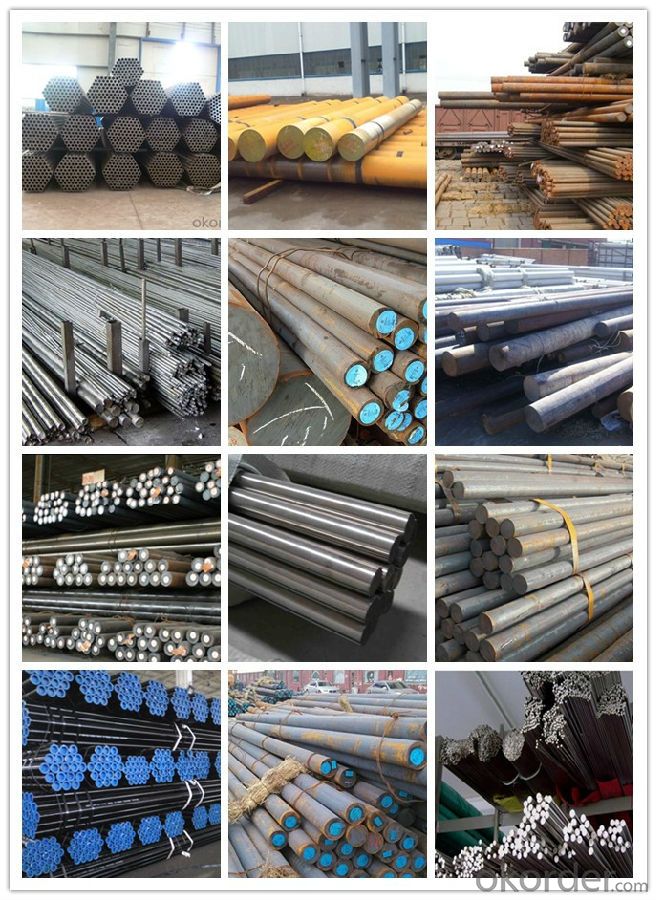
Product detail:
1. Delivery condition: Hot-rolled,black surface. Hot forged +Rough machined (black surface after Q/T)+ Turned (optional), Cold-drawn Conditionm, Q+T with black surface.
2. Chemical composition: %
| C | Si | Mn | P | S | Cr |
| 0.18-0.24 | 0.17-0.37 | 0.7-1.0 | ≤0.03 | ≤0.030 | 0.5-0.9 |
3. Process: EAF + LF + VD + Forged + Heat Treatment (optional)
4. Technical Data: According to the customer's requirement of Chemical Composition, Physical Properties and Mechanical Testing
5. Test: ultrasonic test according to SEP 1921-84 3C/c
6. Material details will be as per agreed technical specifications
7. Certificate of Quality: issued in English, in addition the normal terms, production process, the mechanical property (yield strength, tensile strength, elongation and hardness), forged ratio, UT test result, Grain size, heat treatment methods and the sample of is shown on the Certificate of Quality.
Workshop show
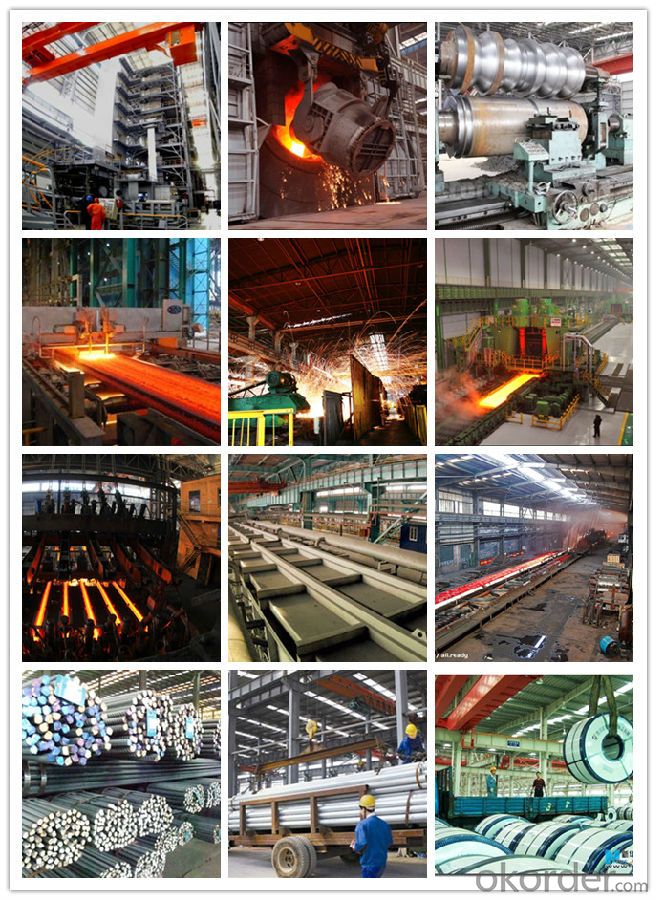
Our service:
-High manufacturing accuracy
-High strength
-Small inertia resistance
-Strong heat dissipation ability
-Good visual effect
-Reasonable price
Chose happens because of quality, then price, We can give you both.Additionally, we can also offer professional products inquiry, products knowledge train(for agents), smooth goods delivery, exellent customer solution proposals.Our service formula: good quality+good price+good service=customer's trust
SGS test is available, customer inspection before shipping is welcome, third party inspection is no problem.
If you need the sample, please feel free to let me know. Any question, we will contact you ASAP!
Alloy steel is a kind of steel in addition to containing silicon and manganese as alloying elements and deoxidizing elements, but also contains other alloy elements such as chromium, nickel, molybdenum, vanadium, titanium, copper, tungsten, aluminum, cobalt, niobium, zirconium and other elements, and some also contain some nonmetallic elements (such as boron, nitrogen, etc.) of the steel. Alloy steel due to the presence of different kinds and quantities of alloying elements and take appropriate measures in the process, can be respectively, with high strength, toughness, quenching through resistance, abrasion resistance, corrosion resistance, resistance to temperature resistance, heat resistance and other special properties.
Alloy steel bar is mainly applicable to drill, milling cutter, reamer. It can also be used for cutting, stamping and measuring tools. It is used in the paper, packaging, printing, non-ferrous metal processing industry. In addition, it is also widely used for processing high-speed steel cutting tool, hard alloy cutter, hard alloy cutting tools, NAS cutting tool, air tool, hard alloy bit, cutter from core bit, high speed steel, taperd milling cutter, cutter metric, micro end milling cutter, the hinge pilot, electronic tools, drilling ladder, metal cutting saw, double assurance diamond, guns, angle cutter, tungsten carbide rotary burrs, hard alloy cutting tools and so on.
- Q: What are the different medical grades of special steel?
- Special steels used in the medical field are typically classified into different grades based on their unique properties and characteristics. These grades are specifically designed to meet the stringent requirements of medical applications, such as surgical instruments, implants, and medical devices. Some of the commonly known medical grades of special steel include: 1. Stainless Steel: Stainless steel is the most widely used medical grade of special steel due to its excellent corrosion resistance and biocompatibility. It contains high amounts of chromium and nickel, which provide resistance against corrosion and make it suitable for use in implants and surgical instruments. 2. Titanium Alloys: Titanium alloys are lightweight yet strong, making them ideal for medical applications such as orthopedic implants, dental implants, and cardiovascular devices. These alloys exhibit high biocompatibility and have excellent resistance to corrosion and fatigue, ensuring long-term durability. 3. Cobalt-Chromium Alloys: Cobalt-chromium alloys possess exceptional strength, wear resistance, and high-temperature stability, making them suitable for implantable devices like hip and knee replacements. They have excellent biocompatibility and offer a good balance between strength and flexibility. 4. Nitinol: Nitinol is a shape memory alloy composed of nickel and titanium. It displays unique properties, such as superelasticity and shape memory effect. Nitinol is commonly used in medical devices like stents, orthodontic wires, and vascular closure devices due to its excellent biocompatibility and ability to adapt to various physiological conditions. 5. High Carbon Stainless Steel: High carbon stainless steel is a specialized grade used in surgical instruments that require exceptional sharpness, hardness, and wear resistance. This grade allows for the production of extremely fine and precise cutting edges, making it suitable for delicate procedures. These are just a few examples of the medical grades of special steel used in the healthcare industry. Each grade offers specific advantages depending on the intended application, and their selection is crucial to ensure optimal performance, biocompatibility, and patient safety.
- Q: Carbon steel and stainless steel and pattern steel and special steel and high carbon steel difference
- Stainless steel with high chromium content and high grade steel is forged together with different steel
- Q: How is duplex stainless steel used in the oil and gas industry?
- Duplex stainless steel is commonly used in the oil and gas industry due to its unique combination of strength, corrosion resistance, and cost-effectiveness. It is utilized in various applications such as pipelines, offshore platforms, and equipment for drilling, extraction, and refining processes. Its resistance to corrosion and high mechanical strength make it suitable for withstanding harsh operating conditions, including exposure to corrosive drilling fluids and high-pressure environments. Overall, duplex stainless steel plays a crucial role in ensuring the integrity and reliability of oil and gas operations.
- Q: What are the challenges in recycling special steel?
- Recycling special steel poses several challenges due to its unique composition and properties. Firstly, special steel is often alloyed with various elements to enhance its strength, durability, and corrosion resistance. These alloys can make the recycling process more difficult and complex compared to recycling common steel. One of the main challenges is the separation of special steel from other metals during the recycling process. Special steel may contain rare and valuable elements such as nickel, chromium, and molybdenum, which are essential for its unique properties. Separating these elements from other metals requires advanced techniques and specialized equipment, increasing the complexity and cost of recycling. Another challenge is the presence of impurities in special steel. These impurities can be introduced during the manufacturing process or through contamination during use. Removing these impurities is crucial to ensure the recycled steel meets the required specifications for its intended applications. However, the high melting point and resistance to purification of some impurities may complicate the recycling process. Furthermore, the physical characteristics of special steel, such as its high hardness and toughness, can make it challenging to handle and process during recycling. Special steel often requires more energy-intensive methods, such as shredding or melting at higher temperatures, which can increase the overall cost and environmental impact of the recycling process. Moreover, the economic viability of recycling special steel can be a challenge. The market demand for special steel may fluctuate, making it difficult for recyclers to ensure a consistent and profitable supply. Additionally, the costs associated with the collection, transportation, sorting, and processing of special steel can be higher compared to common steel, further impacting the economic feasibility of recycling. In conclusion, the challenges in recycling special steel primarily stem from its complex composition, the need for separation from other metals, the presence of impurities, the physical characteristics of the material, and the economic viability of the recycling process. Addressing these challenges requires innovative technologies, efficient separation methods, and a sustainable market demand for recycled special steel.
- Q: What are the main applications of special steel in the chemical industry?
- Special steel is extensively used in the chemical industry for various applications. Some of the main applications include the manufacturing of storage tanks, pipelines, and equipment that require resistance to corrosion, high temperatures, and pressure. Special steel also finds use in the production of catalysts, which are vital for many chemical processes. Additionally, it is employed in the construction of reactors, heat exchangers, and other critical components that require exceptional durability and reliability in harsh chemical environments.
- Q: What are the requirements for special steel used in aerospace defense applications?
- The requirements for special steel used in aerospace defense applications include high strength, excellent corrosion resistance, heat resistance, and the ability to withstand extreme temperatures and pressure. It should also possess good weldability, fatigue resistance, and non-magnetic properties. Additionally, the steel should meet strict quality and certification standards to ensure reliability and safety in critical aerospace defense applications.
- Q: What are the different methods for shot peening special steel?
- The fatigue strength and performance of special steels can be improved through the widely used method of shot peening. Different methods exist for shot peening special steel, each with its own advantages and considerations. One method is air shot peening, which involves propelling small steel shots at high speeds using compressed air. This method is commonly used and effective for treating large surfaces and achieving uniform coverage. However, it may not be suitable for delicate or highly sensitive materials. Another method is wheel shot peening, where steel shots are propelled using a rotating wheel. This method offers better control and accuracy, making it effective for treating small or intricate parts such as gears and shafts. Wet shot peening is a method performed in a wet environment, typically using a mixture of water and shot media. It provides increased control over shot flow and reduces dust formation. This method is preferred for special steels sensitive to heat or at risk of distortion. Ultrasonic shot peening is an advanced method that utilizes high-frequency vibrations to propel the shot media onto the steel surface. It offers enhanced control over shot velocity and impact energy, resulting in improved surface finish and fatigue life. It is particularly useful for thin or delicate special steels. Laser shot peening employs laser pulses to generate shockwaves on the steel surface, creating compressive residual stresses. This method is highly precise and can be controlled to treat specific areas or patterns. It is commonly used for special steels requiring localized treatment or with complex geometries. The selection of the shot peening method depends on various factors, including the type of special steel, component geometry, required surface finish, and desired residual stress profile. Consulting with shot peening experts or engineers is essential to determine the most suitable method for shot peening special steel.
- Q: What is the purpose of cold drawing in special steel production?
- The purpose of cold drawing in special steel production is to improve the mechanical properties and dimensional accuracy of the steel. Cold drawing involves pulling the steel through a die at room temperature, which reduces the cross-sectional area and increases the length of the steel. This process helps to refine the microstructure of the steel, resulting in improved strength, hardness, and toughness. Additionally, cold drawing can enhance the surface finish and straightness of the steel, ensuring precise dimensions and making it suitable for various applications where high-quality steel is required. Overall, cold drawing plays a crucial role in enhancing the performance and quality of special steel, making it more reliable and efficient in various industrial sectors.
- Q: What is special steel? What is special steel?
- There is no uniform definition and concept for special steel at present.It is generally believed that special steel is a kind of steel with special alloy composition, special process smelting and production, special organization and performance, and special requirement.Compared with ordinary steel, special steel has higher strength and toughness, physical properties, chemical properties, biocompatibility and process performance.
- Q: Can special steel be used in the packaging industry?
- Yes, special steel can be used in the packaging industry. Special steel, such as stainless steel, offers excellent durability, corrosion resistance, and strength, making it suitable for various packaging applications. It can be used to manufacture packaging containers, machinery, and equipment, providing a reliable and long-lasting solution for packaging needs.
Send your message to us
JIS Scr420,DIN 20Cr4,SAE 5120, Alloy Steel Bar
- Loading Port:
- China main port
- Payment Terms:
- TT or LC
- Min Order Qty:
- 25 m.t.
- Supply Capability:
- 10000 m.t./month
OKorder Service Pledge
OKorder Financial Service
Similar products
Hot products
Hot Searches
Related keywords

